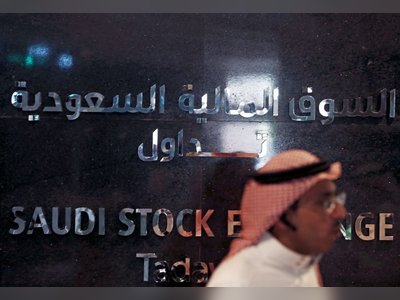US Stock Markets Plummet Amid Tariff Policy Concerns
Intensifying worries regarding President Trump's tariff policies trigger significant declines in major indices and global markets.
US stock markets experienced a sharp decline on Monday, fueled by growing concerns that President Donald Trump's tariff policies could push the largest economy in the world towards recession.
Following years of robust economic growth, questions have arisen regarding the sustainability of the American economic dominance.
The sell-off in stocks was extensive, erasing $1.7 trillion from the S&P 500 index, a key benchmark for global markets.
The index fell by 2.7%, marking a 9% decrease from its peak recorded on February 19. The Nasdaq 100, heavily weighted with technology stocks, encountered its worst day since 2022, losing over $1 trillion in value, as shares of major tech companies such as Alphabet (Google), Amazon, Apple, Microsoft, Meta, Nvidia, and Tesla fell sharply.
Market declines came in the wake of conflicting statements from Trump regarding tariffs, leading to a loss of investor confidence in the stability of US trade policies.
Last week, Trump announced a 25% tariff on imports from Mexico and Canada and doubled the tariffs on Chinese goods to 20%.
However, he later partially reversed this stance, deferring certain increases on Mexican and Canadian tariffs until April 2.
Trump also threatened to implement a global system of reciprocal tariffs, whereby every country would face the same tariffs imposed on US products, starting from April 2. Tariffs of 25% on steel and aluminum imports are set to take effect on Wednesday.
Analysts suggested that these measures may lead to heightened inflation, as increased costs are likely to be passed on to American consumers, potentially stifling economic growth and raising unemployment rates.
Continuous cuts to public spending and geopolitical tensions have further exacerbated economic instability.
Holger Schmieding, chief economist at Berenberg Bank, described Trump as a source of confusion and chaos in these turbulent times.
In response to the market disruptions, Trump defended his policies in an interview with Fox News, asserting that the potential economic risks are worthwhile for achieving a significant economic transformation.
“We are bringing wealth back to America, which is important...
It may take some time, but I believe it will be great for us,” he stated.
When asked about the potential impact of tariffs on inflation, he acknowledged the possibility but added that interest rates have fallen.
Despite the turmoil gripping Wall Street, the White House attempted to maintain an optimistic outlook, highlighting substantial investment pledges from leaders of major corporations.
White House spokesperson Kush DeSai noted on Monday that CEOs have responded to the 'America First' agenda by committing billions in investments, asserting that these investments will create thousands of new jobs.
Kevin Hassett, chairman of the Council of Economic Advisers, downplayed the market volatility, labeling it as simple 'fluctuations in data.' Meanwhile, Commerce Secretary Howard Lutnick suggested in an NBC interview that “there will be no recession in America...
In the next two years, we will witness the strongest period of economic growth.”
The downturn in US markets rippled across global equities, causing sharp declines in Asian stock markets on Tuesday, influenced by the sell-offs in Wall Street.
In Japan, the Nikkei index fell by 3%, reaching its lowest level since September.
The Hang Seng index in Hong Kong dropped by 0.8%, while Chinese stocks lost 0.5%.
In Australia, the primary index decreased by 0.8%.
As economic concerns heightened, investors turned to safe-haven assets, resulting in a rise in the Japanese yen to 147.07 against the dollar, its highest level in five months, along with strengthening of the Swiss franc.
Gold prices continued to climb, reaching $2,895.75 per ounce, nearing an all-time high, with gold up 10% in 2025 after a 27% increase the previous year.
Conversely, oil prices fell for the second consecutive day, with Brent crude futures dropping by 0.65% to $68.83 per barrel.
While President Trump appears determined to proceed with protective trade policies contrary to his previous term, where some measures were retracted amid market turmoil, analysts from Citigroup revised their recommendation on US stocks to 'neutral' from 'overweight,' cautioning that the US economy may not maintain its superiority over the global landscape in the coming months.
Goldman Sachs raised the likelihood of a recession within the next 12 months from 15% to 20%, while JPMorgan Chase increased its estimate from 30% to 40%, citing 'extreme US policies.'
At present, the yield on two-year Treasury bonds declined by 0.05% on Monday, reaching a five-month low, which bolsters expectations that the Federal Reserve may be compelled to reduce interest rates.
The current federal funds target rate stands at approximately 4.3%, a figure that is elevated in comparison to recent historical norms.
Analysts contend that markets have absorbed the message that the Trump Administration is resolute in executing its plans without hesitation, potentially positioning a recession as an unavoidable reality.
Following years of robust economic growth, questions have arisen regarding the sustainability of the American economic dominance.
The sell-off in stocks was extensive, erasing $1.7 trillion from the S&P 500 index, a key benchmark for global markets.
The index fell by 2.7%, marking a 9% decrease from its peak recorded on February 19. The Nasdaq 100, heavily weighted with technology stocks, encountered its worst day since 2022, losing over $1 trillion in value, as shares of major tech companies such as Alphabet (Google), Amazon, Apple, Microsoft, Meta, Nvidia, and Tesla fell sharply.
Market declines came in the wake of conflicting statements from Trump regarding tariffs, leading to a loss of investor confidence in the stability of US trade policies.
Last week, Trump announced a 25% tariff on imports from Mexico and Canada and doubled the tariffs on Chinese goods to 20%.
However, he later partially reversed this stance, deferring certain increases on Mexican and Canadian tariffs until April 2.
Trump also threatened to implement a global system of reciprocal tariffs, whereby every country would face the same tariffs imposed on US products, starting from April 2. Tariffs of 25% on steel and aluminum imports are set to take effect on Wednesday.
Analysts suggested that these measures may lead to heightened inflation, as increased costs are likely to be passed on to American consumers, potentially stifling economic growth and raising unemployment rates.
Continuous cuts to public spending and geopolitical tensions have further exacerbated economic instability.
Holger Schmieding, chief economist at Berenberg Bank, described Trump as a source of confusion and chaos in these turbulent times.
In response to the market disruptions, Trump defended his policies in an interview with Fox News, asserting that the potential economic risks are worthwhile for achieving a significant economic transformation.
“We are bringing wealth back to America, which is important...
It may take some time, but I believe it will be great for us,” he stated.
When asked about the potential impact of tariffs on inflation, he acknowledged the possibility but added that interest rates have fallen.
Despite the turmoil gripping Wall Street, the White House attempted to maintain an optimistic outlook, highlighting substantial investment pledges from leaders of major corporations.
White House spokesperson Kush DeSai noted on Monday that CEOs have responded to the 'America First' agenda by committing billions in investments, asserting that these investments will create thousands of new jobs.
Kevin Hassett, chairman of the Council of Economic Advisers, downplayed the market volatility, labeling it as simple 'fluctuations in data.' Meanwhile, Commerce Secretary Howard Lutnick suggested in an NBC interview that “there will be no recession in America...
In the next two years, we will witness the strongest period of economic growth.”
The downturn in US markets rippled across global equities, causing sharp declines in Asian stock markets on Tuesday, influenced by the sell-offs in Wall Street.
In Japan, the Nikkei index fell by 3%, reaching its lowest level since September.
The Hang Seng index in Hong Kong dropped by 0.8%, while Chinese stocks lost 0.5%.
In Australia, the primary index decreased by 0.8%.
As economic concerns heightened, investors turned to safe-haven assets, resulting in a rise in the Japanese yen to 147.07 against the dollar, its highest level in five months, along with strengthening of the Swiss franc.
Gold prices continued to climb, reaching $2,895.75 per ounce, nearing an all-time high, with gold up 10% in 2025 after a 27% increase the previous year.
Conversely, oil prices fell for the second consecutive day, with Brent crude futures dropping by 0.65% to $68.83 per barrel.
While President Trump appears determined to proceed with protective trade policies contrary to his previous term, where some measures were retracted amid market turmoil, analysts from Citigroup revised their recommendation on US stocks to 'neutral' from 'overweight,' cautioning that the US economy may not maintain its superiority over the global landscape in the coming months.
Goldman Sachs raised the likelihood of a recession within the next 12 months from 15% to 20%, while JPMorgan Chase increased its estimate from 30% to 40%, citing 'extreme US policies.'
At present, the yield on two-year Treasury bonds declined by 0.05% on Monday, reaching a five-month low, which bolsters expectations that the Federal Reserve may be compelled to reduce interest rates.
The current federal funds target rate stands at approximately 4.3%, a figure that is elevated in comparison to recent historical norms.
Analysts contend that markets have absorbed the message that the Trump Administration is resolute in executing its plans without hesitation, potentially positioning a recession as an unavoidable reality.








